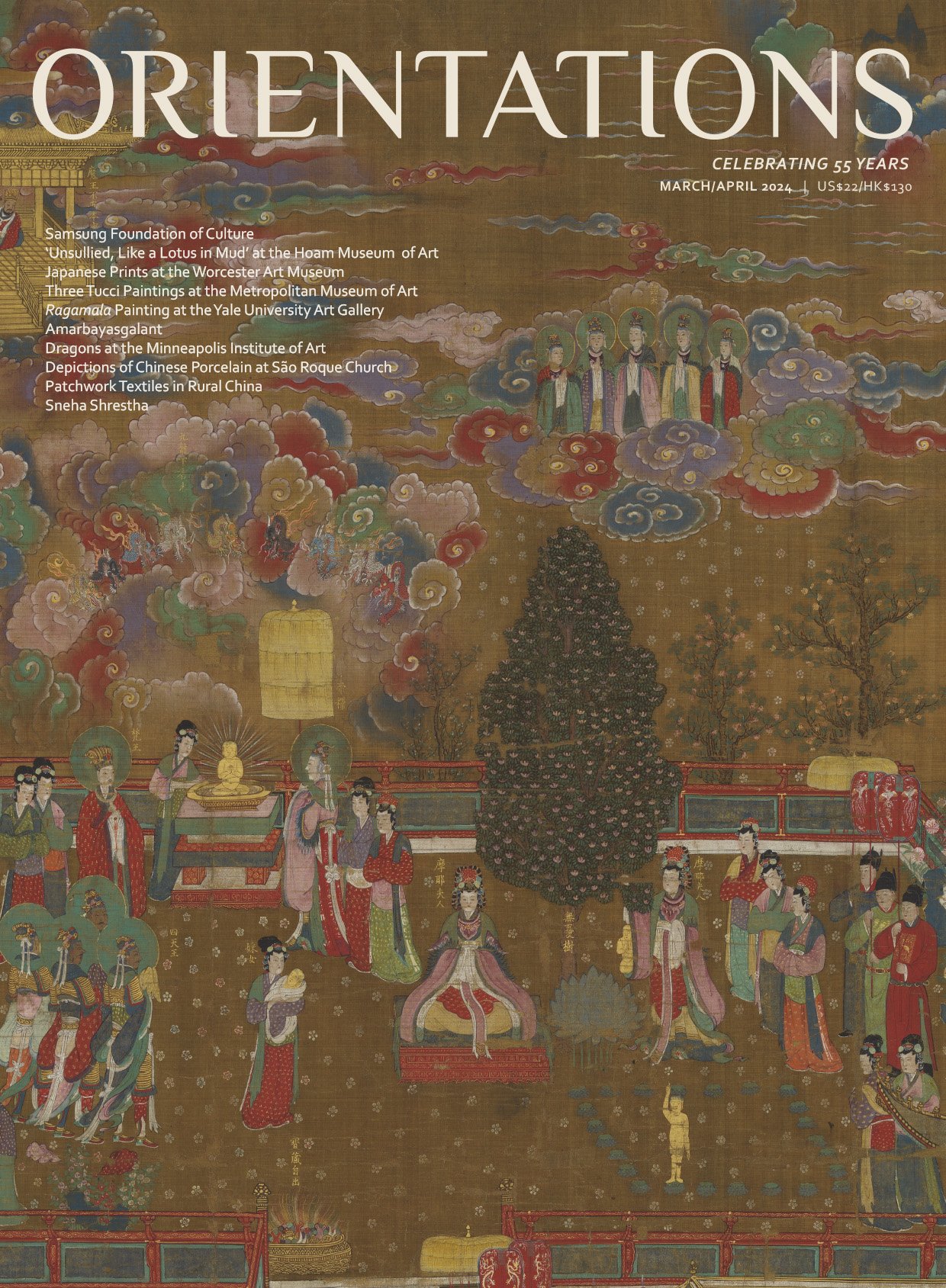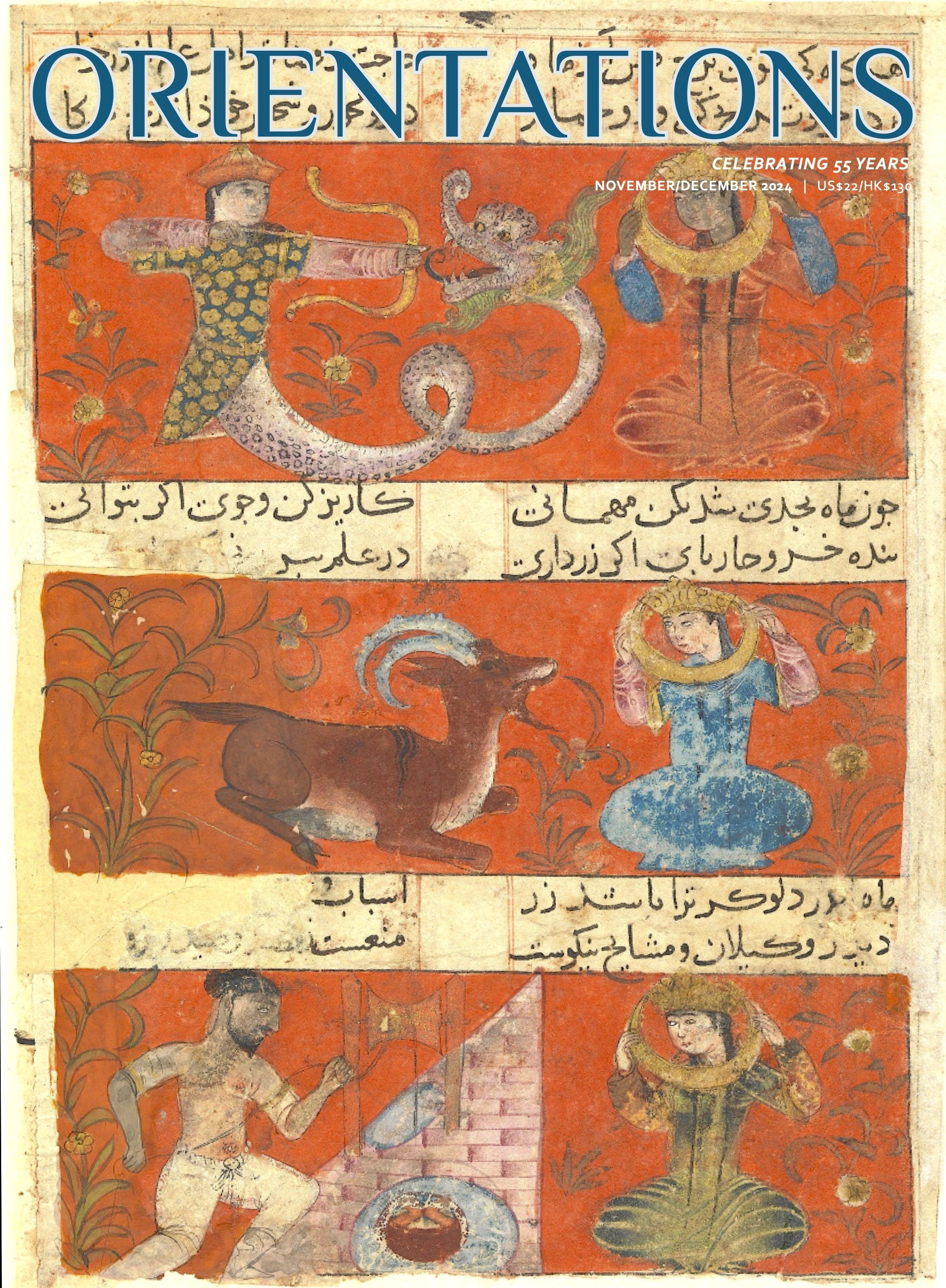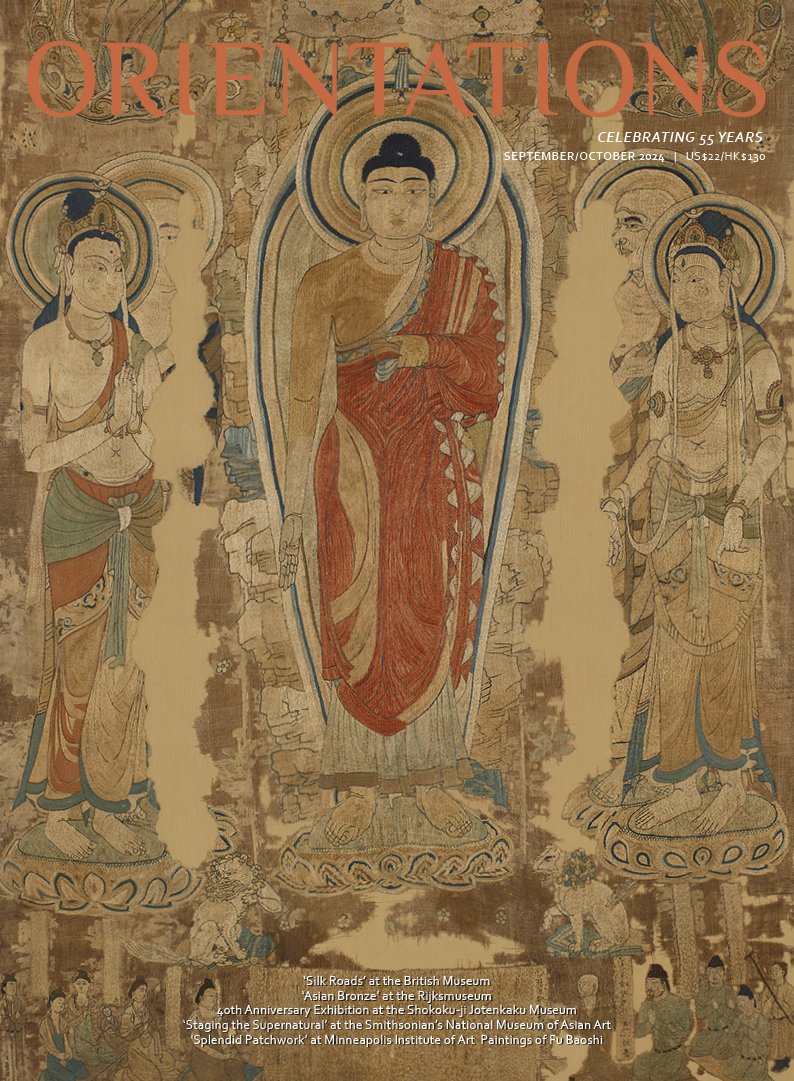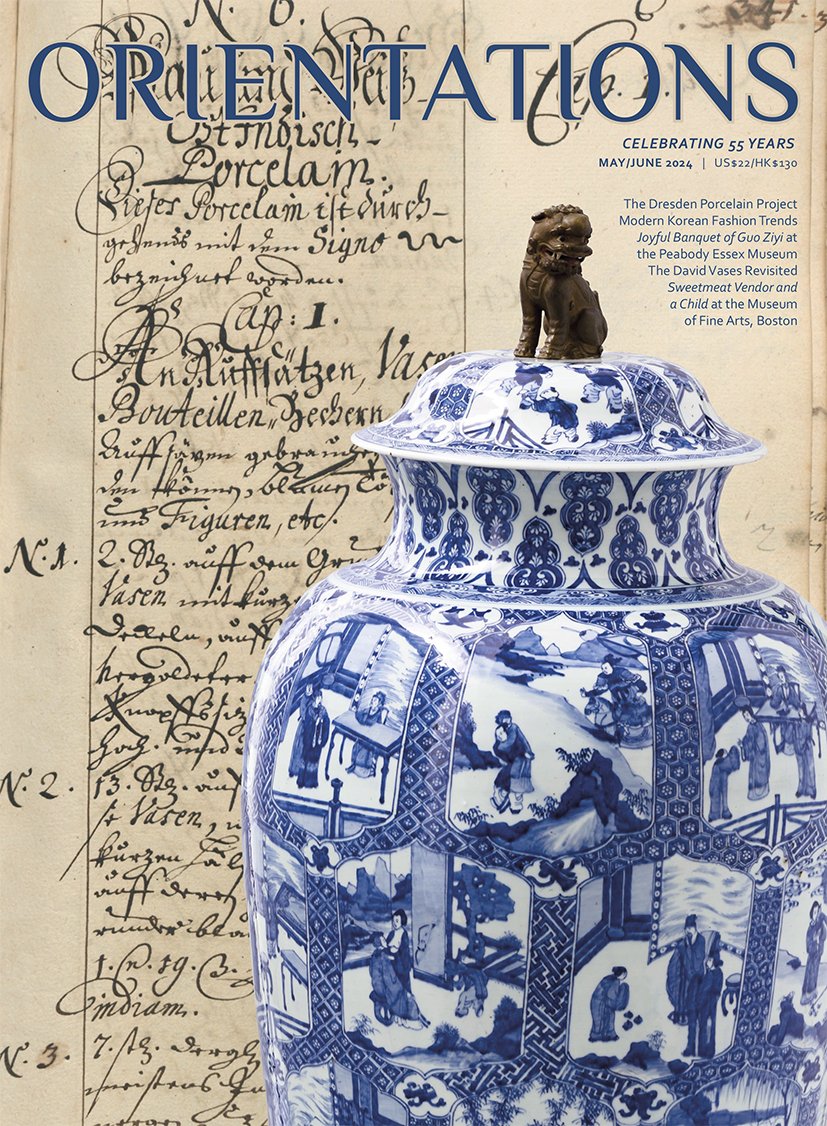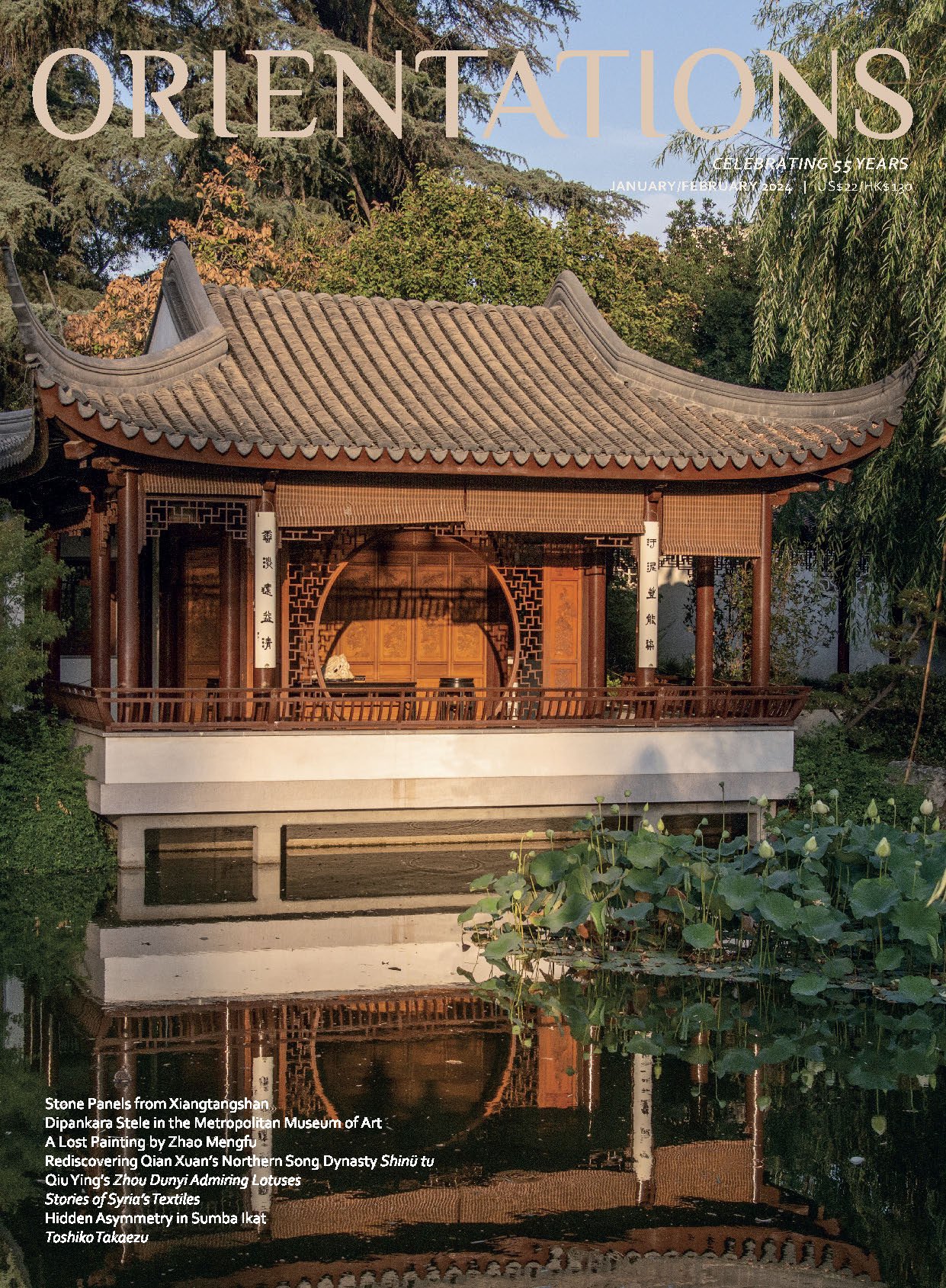MAR/APR 2024
VOLUME 55 - NUMBER 2
Shortly after my trip to Seoul in September last year, where I visited the Leeum Museum of Art, I was contacted by the museum’s curator of Buddhist Art, Seunghye Lee, about featuring an upcoming new exhibition. It is with pleasure that we share with our readers ‘Unsullied, Like a Lotus in Mud’, an exhibition of Buddhist art from Korea, Japan, and China that explores gender-related issues. With 92 pieces gathered from 27 collections worldwide, the theme of women as both objects and subjects in Buddhism transcends regional and chronological boundaries. The Hoam Museum of Art was opened in 1982 by the founder of Samsung Group, Lee Byung-chull (1910–87), an ardent art collector who established the Samsung Foundation of Culture in 1965 to safeguard Korea’s cultural legacy; the Leeum Museum of Art was subsequently opened in 2004.
Buddhism has been a great source of art, cultural exchange, and trade. Mongolia’s Amarbayasgalant Monastery, built between 1727 and 1736, holds historical connections to the Mongol cleric Zanabazar (1635–1723) and to several Qing dynasty emperors. Its Sino-Tibetan-Mongolian construction illustrates the crucial role of architecture in establishing a Chinese presence in Mongolia. The Italian Tibetologist Giuseppe Tucci (1895–1984) made eight expeditions to the Tibetan plateau between 1928 and 1948, during which he was able to acquire many artefacts, including a group of tangkas. Three of these have now entered the collection of the Metropolitan Museum of Art, allowing accessibility to a wider audience.
The São Roque Church is the earliest Jesuit church in Portugal and is known for its paintings with depictions of Chinese porcelains. We show how these export items were used in a Western context, shedding light on Portuguese trade with Asia in the 15th century.
Patchworked textiles arrived in China almost two thousand years ago following the introduction of Buddhism. We explore modern-day creations by artists in villages in Shaanxi, Shanxi, and Hebei provinces, who have taken patchwork to a new level.
This spring, 130 Japanese prints and paintings from the Worcester Art Museum are on view at the Blanton Museum of Art in ‘The Floating World: Masterpieces of Edo Japan from the Worcester Art Museum’. The collection was founded in 1901 when John Chandler Bancroft (1835–1901) donated his collection of over 3,000 Edo period (1603–1868) ukiyo-e prints of exceptional quality and rarity.
Ragamala is a unique category of miniature painting popularized in northern India from the 16th century, typically using human characters to convey the emotional essence of varied melodies and their poetic symbolism. An ascetic and four wrestlers in a painting from the Yale University Art Gallery represent physical and mental strength within the broader cultural, religious, and artistic context of northern India.
To celebrate the Chinese Year of the Dragon, the Minneapolis Institute of Art presents ‘Year of the Dragon: Mystical Creatures of the Sky’, an exhibition of objects drawn from the museum’s own Chinese art collection that explores the evolution of dragon imagery and its connotations throughout Chinese art history.
FEATURES
Tae Hyunsun. From Leisure Pursuit to Life Commitment: Samsung Foundation of Culture Collections and Museums
Seunghye Lee. Then She Met Buddha ‘Unsullied, Like a Lotus in Mud’ at the Hoam Museum of Art
Fiona Collins. The Floating World through the Eyes of John Chandler Bancroft: The Founding of the Worcester Art Museum’s Japanese Print Collection
John Guy. The Transcendent Buddha, the Revered Teacher, and the Dharma Guardian: Three Tibetan Paintings from the Tucci Expeditions
Yagnaseni Datta. Practice as Power: Wrestlers and Ascetics in a Ragamala Painting from Northern India
Nancy S. Steinhardt. Amarbayasgalant: A Qing Monastery in the Imperial Hinterland
Liu Yang. Year of the Dragon: Mystical Creatures of the Sky
Christiaan J. A. Jörg. Early Depictions of Chinese Porcelain: Treasures in the São Roque Church, Lisbon
Nancy Berliner. Village Abstraction: Patchwork Textiles in Rural China
Rachel Parikh. ‘Sneha Shrestha: Ritual and Devotion’
VOLUME 55 - NUMBER 2
Shortly after my trip to Seoul in September last year, where I visited the Leeum Museum of Art, I was contacted by the museum’s curator of Buddhist Art, Seunghye Lee, about featuring an upcoming new exhibition. It is with pleasure that we share with our readers ‘Unsullied, Like a Lotus in Mud’, an exhibition of Buddhist art from Korea, Japan, and China that explores gender-related issues. With 92 pieces gathered from 27 collections worldwide, the theme of women as both objects and subjects in Buddhism transcends regional and chronological boundaries. The Hoam Museum of Art was opened in 1982 by the founder of Samsung Group, Lee Byung-chull (1910–87), an ardent art collector who established the Samsung Foundation of Culture in 1965 to safeguard Korea’s cultural legacy; the Leeum Museum of Art was subsequently opened in 2004.
Buddhism has been a great source of art, cultural exchange, and trade. Mongolia’s Amarbayasgalant Monastery, built between 1727 and 1736, holds historical connections to the Mongol cleric Zanabazar (1635–1723) and to several Qing dynasty emperors. Its Sino-Tibetan-Mongolian construction illustrates the crucial role of architecture in establishing a Chinese presence in Mongolia. The Italian Tibetologist Giuseppe Tucci (1895–1984) made eight expeditions to the Tibetan plateau between 1928 and 1948, during which he was able to acquire many artefacts, including a group of tangkas. Three of these have now entered the collection of the Metropolitan Museum of Art, allowing accessibility to a wider audience.
The São Roque Church is the earliest Jesuit church in Portugal and is known for its paintings with depictions of Chinese porcelains. We show how these export items were used in a Western context, shedding light on Portuguese trade with Asia in the 15th century.
Patchworked textiles arrived in China almost two thousand years ago following the introduction of Buddhism. We explore modern-day creations by artists in villages in Shaanxi, Shanxi, and Hebei provinces, who have taken patchwork to a new level.
This spring, 130 Japanese prints and paintings from the Worcester Art Museum are on view at the Blanton Museum of Art in ‘The Floating World: Masterpieces of Edo Japan from the Worcester Art Museum’. The collection was founded in 1901 when John Chandler Bancroft (1835–1901) donated his collection of over 3,000 Edo period (1603–1868) ukiyo-e prints of exceptional quality and rarity.
Ragamala is a unique category of miniature painting popularized in northern India from the 16th century, typically using human characters to convey the emotional essence of varied melodies and their poetic symbolism. An ascetic and four wrestlers in a painting from the Yale University Art Gallery represent physical and mental strength within the broader cultural, religious, and artistic context of northern India.
To celebrate the Chinese Year of the Dragon, the Minneapolis Institute of Art presents ‘Year of the Dragon: Mystical Creatures of the Sky’, an exhibition of objects drawn from the museum’s own Chinese art collection that explores the evolution of dragon imagery and its connotations throughout Chinese art history.
FEATURES
Tae Hyunsun. From Leisure Pursuit to Life Commitment: Samsung Foundation of Culture Collections and Museums
Seunghye Lee. Then She Met Buddha ‘Unsullied, Like a Lotus in Mud’ at the Hoam Museum of Art
Fiona Collins. The Floating World through the Eyes of John Chandler Bancroft: The Founding of the Worcester Art Museum’s Japanese Print Collection
John Guy. The Transcendent Buddha, the Revered Teacher, and the Dharma Guardian: Three Tibetan Paintings from the Tucci Expeditions
Yagnaseni Datta. Practice as Power: Wrestlers and Ascetics in a Ragamala Painting from Northern India
Nancy S. Steinhardt. Amarbayasgalant: A Qing Monastery in the Imperial Hinterland
Liu Yang. Year of the Dragon: Mystical Creatures of the Sky
Christiaan J. A. Jörg. Early Depictions of Chinese Porcelain: Treasures in the São Roque Church, Lisbon
Nancy Berliner. Village Abstraction: Patchwork Textiles in Rural China
Rachel Parikh. ‘Sneha Shrestha: Ritual and Devotion’
VOLUME 55 - NUMBER 2
Shortly after my trip to Seoul in September last year, where I visited the Leeum Museum of Art, I was contacted by the museum’s curator of Buddhist Art, Seunghye Lee, about featuring an upcoming new exhibition. It is with pleasure that we share with our readers ‘Unsullied, Like a Lotus in Mud’, an exhibition of Buddhist art from Korea, Japan, and China that explores gender-related issues. With 92 pieces gathered from 27 collections worldwide, the theme of women as both objects and subjects in Buddhism transcends regional and chronological boundaries. The Hoam Museum of Art was opened in 1982 by the founder of Samsung Group, Lee Byung-chull (1910–87), an ardent art collector who established the Samsung Foundation of Culture in 1965 to safeguard Korea’s cultural legacy; the Leeum Museum of Art was subsequently opened in 2004.
Buddhism has been a great source of art, cultural exchange, and trade. Mongolia’s Amarbayasgalant Monastery, built between 1727 and 1736, holds historical connections to the Mongol cleric Zanabazar (1635–1723) and to several Qing dynasty emperors. Its Sino-Tibetan-Mongolian construction illustrates the crucial role of architecture in establishing a Chinese presence in Mongolia. The Italian Tibetologist Giuseppe Tucci (1895–1984) made eight expeditions to the Tibetan plateau between 1928 and 1948, during which he was able to acquire many artefacts, including a group of tangkas. Three of these have now entered the collection of the Metropolitan Museum of Art, allowing accessibility to a wider audience.
The São Roque Church is the earliest Jesuit church in Portugal and is known for its paintings with depictions of Chinese porcelains. We show how these export items were used in a Western context, shedding light on Portuguese trade with Asia in the 15th century.
Patchworked textiles arrived in China almost two thousand years ago following the introduction of Buddhism. We explore modern-day creations by artists in villages in Shaanxi, Shanxi, and Hebei provinces, who have taken patchwork to a new level.
This spring, 130 Japanese prints and paintings from the Worcester Art Museum are on view at the Blanton Museum of Art in ‘The Floating World: Masterpieces of Edo Japan from the Worcester Art Museum’. The collection was founded in 1901 when John Chandler Bancroft (1835–1901) donated his collection of over 3,000 Edo period (1603–1868) ukiyo-e prints of exceptional quality and rarity.
Ragamala is a unique category of miniature painting popularized in northern India from the 16th century, typically using human characters to convey the emotional essence of varied melodies and their poetic symbolism. An ascetic and four wrestlers in a painting from the Yale University Art Gallery represent physical and mental strength within the broader cultural, religious, and artistic context of northern India.
To celebrate the Chinese Year of the Dragon, the Minneapolis Institute of Art presents ‘Year of the Dragon: Mystical Creatures of the Sky’, an exhibition of objects drawn from the museum’s own Chinese art collection that explores the evolution of dragon imagery and its connotations throughout Chinese art history.
FEATURES
Tae Hyunsun. From Leisure Pursuit to Life Commitment: Samsung Foundation of Culture Collections and Museums
Seunghye Lee. Then She Met Buddha ‘Unsullied, Like a Lotus in Mud’ at the Hoam Museum of Art
Fiona Collins. The Floating World through the Eyes of John Chandler Bancroft: The Founding of the Worcester Art Museum’s Japanese Print Collection
John Guy. The Transcendent Buddha, the Revered Teacher, and the Dharma Guardian: Three Tibetan Paintings from the Tucci Expeditions
Yagnaseni Datta. Practice as Power: Wrestlers and Ascetics in a Ragamala Painting from Northern India
Nancy S. Steinhardt. Amarbayasgalant: A Qing Monastery in the Imperial Hinterland
Liu Yang. Year of the Dragon: Mystical Creatures of the Sky
Christiaan J. A. Jörg. Early Depictions of Chinese Porcelain: Treasures in the São Roque Church, Lisbon
Nancy Berliner. Village Abstraction: Patchwork Textiles in Rural China
Rachel Parikh. ‘Sneha Shrestha: Ritual and Devotion’

